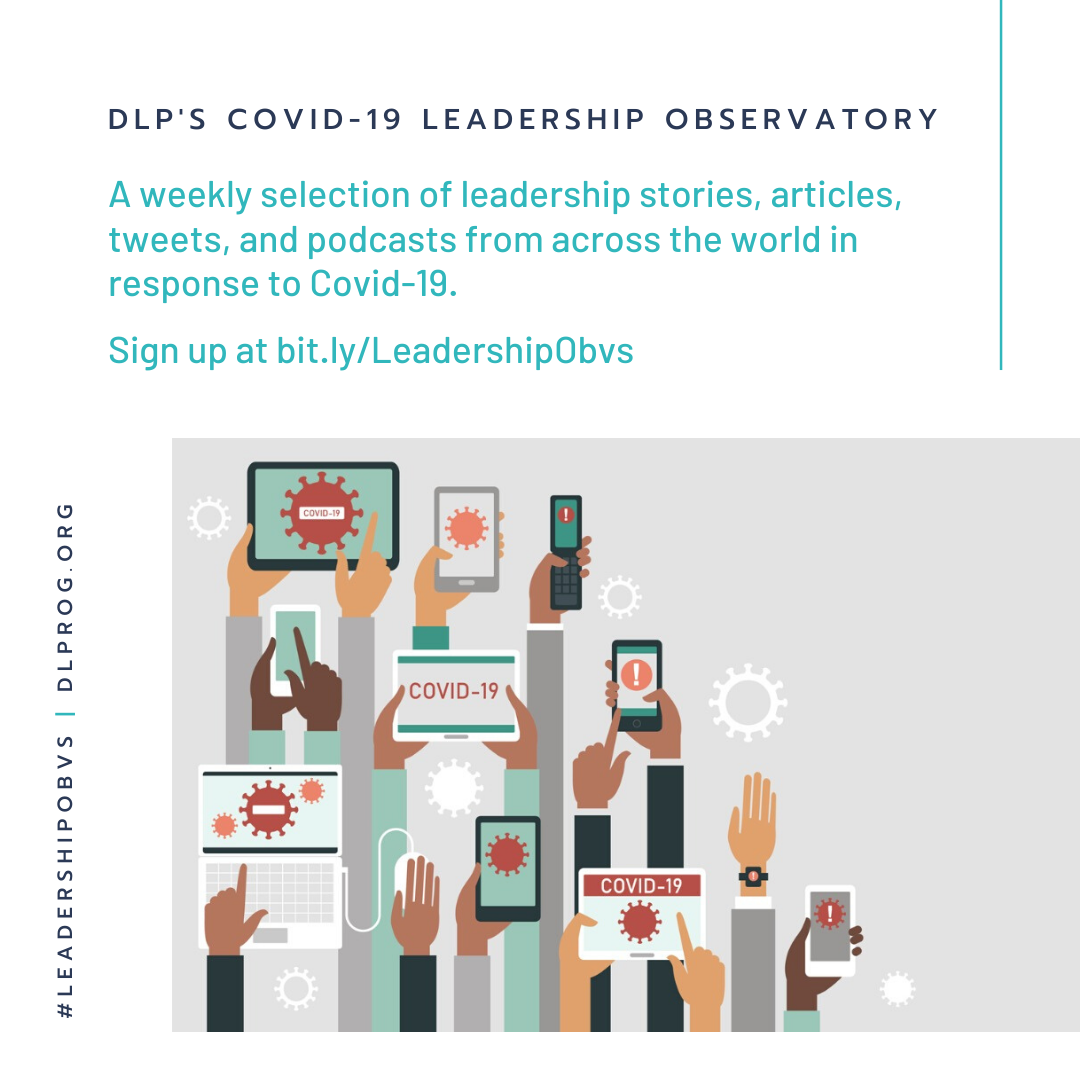During the Covid-19 pandemic, DLP remains committed to supporting leadership, wherever it may be, by helping the flow of knowledge and experience between practitioners, policymakers and researchers. DLP’s weekly #LeadershipObvs collects and summarises all of the leadership focussed resources that we have found most useful for understanding developmental leadership during the crisis – whether they be reports, articles, tweets, videos, podcasts, blogs or other. Covering everything from the challenges of leadership, how to navigate the current conjuncture, how to support processes of leadership, or looking to the future of leadership. Each Observatory is a five-minute read summarising and linking to some of the most helpful work on leadership that week.
Aletia Dundas, ‘Faith and health in the time of COVID-19’, Devpolicy, 12 May 2020
Faith-based and government leadership should work hand in hand during a time of crisis. Church leaders are countering bad theology from sources outside the Pacific with positive theological messaging to support government and health messaging. They have been speaking on the radio and circulating memoranda to their members to ensure community safety by encouraging effective social distancing and handwashing. Dundas argues that faith leaders can correct the ongoing false narrative that Pacific islands will not be impacted by coronavirus. Faith leadership has been instrumental to community recovery after other natural disasters.
#LeadershipObvs in a nutshell: Faith leadership is playing a vital role in encouraging communities to follow medical advice.
Nic Maclellan, ‘InDepth: Pacific Islands Forum Secretary General, Dame Meg Taylor’, Islands Business, 23 April 2020
This interview with Dame Taylor explores Pacific community responses to COVID-19, how the pandemic will affect island security and international geo-politics, and if attention will be diverted away from other core key regional concerns. Dame Taylor reports that ‘the feeling amongst leaders in the Pacific is that we’re going to take control in our countries and our region. If we don’t, we’re going to be left at the whim and interests of others. For the leaders, as well as looking at domestic issues, they’re also looking at how the geo-politics will play out.’ Pacific islands want to increase regional collaboration, and ensure the Pacific voice is being heard.
#LeadershipObvs in a nutshell: Pacific leaders are collaborating regionally and nationally to ensure their voice is heard.
Per Øyvind Bastøe, Wendy Asbeek Brusse and Jörg Faust, ‘COVID-19 and Development Co-operation: we know a lot about what works, let’s use the evidence’, EADi, 12 May 2020
This blog encourages development practitioners and policymakers to use evidence and evaluation to prevent a humanitarian disaster. The effectiveness and relevance of current relief efforts will increase substantially by learning from previous pandemics (SARS, Ebola, Avian Influenza). To retain legitimacy, development partners should use transparent communications and messages. They should engage with political leadership at the national level and foster ownership at the local level. Politicians and managers are encouraged to be open to the findings of evaluators and translate that knowledge into action.
#LeadershipObvs in a nutshell: Development partners learn from evidence of what worked in previous pandemics to improve assistance and co-operation.
Peter Harrington, ‘COVID-19: Planning for Tomorrow’s Problems Today’, Building State Capability, 17 April 2020
How do we plan for problems we don’t know are coming? This blog, written for public leaders, applies the familiar two by two ‘important versus urgent’ matrix to the health and economic sectors to illustrate how leaders can prepare for unknown problems. Leaders are encouraged to divert attention to medium-term and long-term recovery plans. But the biggest challenge for public leaders is the interdependence between urgent medical responses and long-term economic problems that can, over time, undermine the medical response.
#LeadershipObvs in a nutshell: Governments should plan for problems down the line, or they risk being trapped in a cycle of outbreaks and economic collapse.
Punit Renjen, ‘COVID-19: How leaders can create a new and better normal’, World Economic Forum, 11 May 2020
Leaders need to shift from a respond to a recover mindset to navigate the unknown future environment. Defining the destination first and working backwards will help leaders create more aggressive and creative plans. Renjen highlights the importance of being a resilient and agile leader who can understand the needs of their followership. Trust can be a catalyst in the recovery phase, and can be split into four categories – physical, emotional, financial and digital. Leaders should support one of these areas first, depending on the needs of their followers. COVID-19 has provided leaders with the opportunity to reinvent a new normal: returning to the world that existed before would mark failure.
#LeadershipObvs in a nutshell: Leaders have an opportunity to innovate and create a new normal during this crisis.
Matt Andrews, ‘Listen to our sixth virtual discussion on Leadership Through Crisis’, Building State Capability, 1 May 2020
This virtual discussion focuses on public leadership through crisis. Andrews guides us through reflections on technology and systems development, skills of government officials, rapid implementation of policies, and the risks of policies being contested through the court system. Politicians are encouraged to take risks, pivot and become good at identifying mistakes.
#LeadershipObvs in a nutshell: Leaders need to pivot, take risks and become good at identifying mistakes.
Sign up to receive the #LeadershipObvs directly to your inbox
A full list of leadership resources
Other resources are available on Twitter using #LeadershipObvs @DLProg











